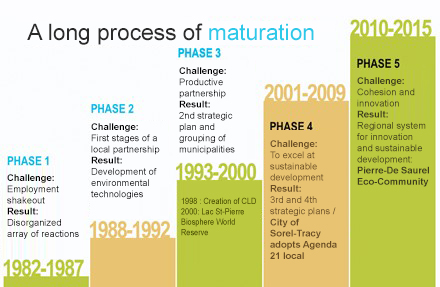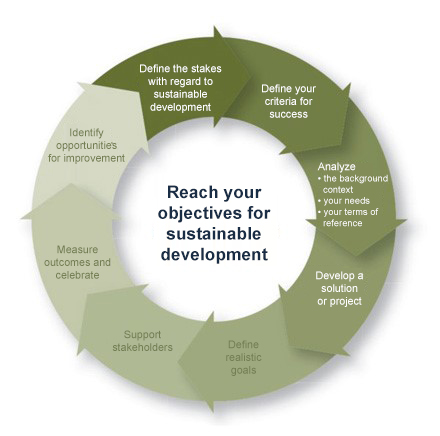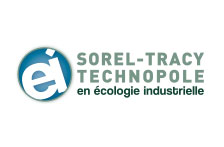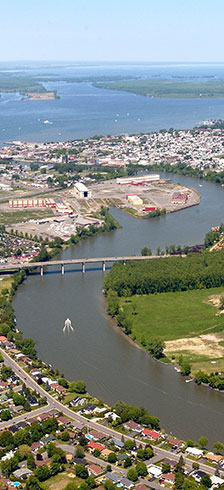You are here
Historical
Faced with the challenges involved in becoming a community focused on sustainable development, the Sorel-Tracy region opted for innovation. Essentially, this path makes change a prerequisite for success. Thinking and acting differently become the foundations of improving or achieving sustainability within institutions and organizations.
Only when it is part of a social framework favourable to its use and development does innovation have value and become a source of wealth creation (social, environmental and economic). But all too often, sustainable development is approached solely from the perspective of using environmental technologies. Setting up a responsible, ecologically viable, and socially acceptable production and consumption system will thus require significant changes in organizational cultures over the coming years. Businesses will also need to be inventive and look at combining various approaches, strategies, management tools and technologies that take into account social, environmental and economic factors.
The move towards sustainable development suited to our needs is the result of a long maturation process that has involved numerous consultations, strategic planning and open cooperation among all stakeholders, particularly citizens.

Proud of its history, its culture and its people, the region strives to promote development within the scope of an innovative approach that takes into consideration the potential and the contribution of the region’s nature, its assets and its population, while minimizing its ecological footprint. The approach is one of continuous improvement, inspired by the model presented below:

The first eco-industrial technocity in Quebec owes its existence to the City of Sorel-Tracy, which began to develop an extraordinary knowledge hub in the 1990s. This expertise has taken shape around the heritage of the Centre de recherche en environnement UQAM/Sorel-Tracy, the development of the Technology Transfer Centre in Industrial Ecology (TTCIE) and the Sorel-Tracy CEGEP, the presence of the Centre de technologie Rio Tinto Fer et Titane (RTFT Technology Centre) and the Alstom Global Technology Centre for sustainable hydroelectric power. Moreover, this know-how is consolidated by the implementation of sustainable development practices by more than a dozen regional businesses.
In 2008, the Eco-Industrial Technocity (EIT) was given a mandate by the Sorel-Tracy region to prepare and submit an application to Zones Québec Innovation. The application for innovation zone certification was filed on 12 March 2012, at City Hall in Sorel-Tracy.
Upon obtaining this certification, one of the roles of the EIT will be to encourage a growing number of businesses to integrate the principles of sustainable development in their operations, processes, products, services, maintenance, building management, transport, stores, project development and administration.
The EIT will also strive to enhance its knowledge hub by inviting eco-industrial research and development firms to come and take advantage of the region’s strong innovative capacity.
Another of the EIT’s roles will be to demonstrate the Technocity’s expertise at the global level by hosting incoming missions, taking part in international conferences and making its services available to emerging countries.
Industrial ecology is a concept that was developed about 30 years ago, and the first practical experiences form the foundation of the current implementation of sustainable development practices in the industrial sector as well as in businesses, institutions, business services and organizations.
This view of the industrial sector as an ecosystem is relatively new in Quebec. The concept was brought into being here is the Sorel-Tracy region, chiefly through the emergence of the Technology Transfer Centre in Industrial Ecology (TTCIE). The practice of industrial ecology led the heavy industries to focus more attention on their environmental impact and bring their development in line with the three components of sustainable development. Likewise, industrial ecology has spawned surprising results among the dozen of the region’s progressive SMEs (small to medium-size businesses) that have integrated those principles and seen to what extent sustainable development practices can directly affect market stability.
Our partner, the TTCIE, acts as a figurehead in research and development in industrial ecology. The Centre promotes greater awareness of profitability in businesses by calling into question common industry practice, particularly with regard to waste material reclamation.

